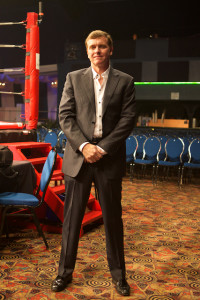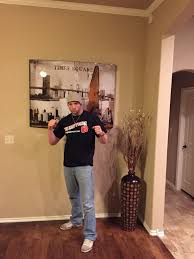Tony Holden: The Unexpected Path to Becoming a Promoter, Putting Fighters Before the Dollar and Taking a Second Run at Promoting a New Generation of Fighters
 Exclusive Interview by Jesse “New School” Wright
Exclusive Interview by Jesse “New School” Wright
Photos copyrighted by Ringside Report
“I probably could’ve made a lot more money and a lot more impact. You know, the fighters are the ones getting in the ring. The fighters are the ones that are actually putting their lives on the line, and you know, there are some promoters that are just flat flesh paddlers. I’ve always respected my fighters. You’ve gotta look, a promoter is only as good as his fighters. They’re the reason you’re getting paid and they’re the reason you are who you are.” — Tony Holden
As fans, it’s easy to complain about promoters in boxing. Sometimes you don’t like that your favorite fighter isn’t getting a push, or maybe it’s that the matchmaking isn’t up to your standard. The things we never see as fans are the tough ethical decisions that promoters need to make. Protecting a fighter’s safety and best interest is not something that we consider as fans, but to Tony Holden, it’s everything. As a promoter, you’re responsible for a fighter’s life, and Holden takes that responsibility very seriously. When everybody gave up on Tommy Morrison, Holden was the one there to rebuild him back in to a star. The highs are high, but the valleys are deep and dark. Holden takes us through all of it.
JW: How did you first get started as a promoter?
I was a television producer and I did an outdoors show where we went to these exotic places fishing with celebrities; this was in the 80’s. We went all over from the Amazon jungle to the Arctic Circle, everywhere. At one point, a guest fell out. I was living in Kansas City at the time, and that’s where Tommy Morrison was. He was nobody then, he was just up and coming and I thought, I’m gonna grab this kid and put him on a show, if he makes it we can air it, if not we’ll pull it. So I took him and we went to Colorado trout fishing and we became really good friends. He told me he was having a lot of problems, and next thing you know, I was involved in promoting him in a 20,000 square foot arena, and it just never ended from there on. That’s where I ended up, when Tommy’s career was over, I had many other world champions and it just turned out very successful.
JW: Did it all really start with taking a chance on Tommy?
No, not as a fight promoter. As a fight promoter, I wasn’t planning on being a fight promoter. I just wanted to help him out and promote these shows and it just got out of control fast where I had all these obligations. The next thing I knew, he was under contract with Bob Arum at that time and Bob was his promoter at that time. Bob saw me and what I was doing and put me on the road wherever Tommy was going. So I worked directly with Bob. Then when Bob’s contract ran out, that’s when Tommy… Well actually that’s when Tommy got knocked out, and everybody left him including Arum, because we were suppose to go to an $8 million dollar contract fighting Lennox Lewis and we lost on a tune up fight leading up to that fight, so we never had a chance to fight Lewis before that fight. So we went from getting an $8 million paycheck, everybody left and I took him, to 60 grand on ESPN, and I had to rebuild him all by myself. Tommy Virgetts his trainer was right there with me. It was just us three, and we ended up getting that Lewis fight again after we rebuilt him.
JW: Would you say that your path to becoming a promoter is atypical? Would you say most promoters have a clearer cut path?
That’s a good question. I haven’t asked most promoters, but I think most promoters it’s a clear cut path. Mine was extremely accidental, but I don’t know a lot of promoters who got in it the way I have.
JW: What would you say is the typical blueprint to becoming a promoter?
Well, a promoter is only as good as his fighters. So you’re going to have to be able to recruit. Then after you recruit, you’re going to have to be able to deliver. These fighters are going to need fights. One thing that I’m seeing in the last ten years that’s falling is they’re not marketing they’re fighters. They’re just trying to get them fights. It’s also a popularity contest. There are world champion fighters out there that make peanuts, and then there are fighters out there who are popular and make millions and millions of dollars. I was fortunate enough to work with Prince Naseem Hamed toward the end of his career and there was a time it wasn’t about the belt, it was about his popularity. A good example is Deontay Wilder. Here’s a perfect model to promote. He’s a heavyweight champion of the world and he’s from the U.S. You don’t see him on late night talk shows, you don’t see him out there marketing himself and showing off his personality. It’s really a shame because that’s an aspect that I think the game has lost.
JW: Do you think the role of a promoter has changed over the years?
I think the role is the same, but the game has changed. A promoter still has to do what he did in the 80’s: try to get television networks for your fights and fighters. There are so many different revenue streams for a promoter. You can have a club promoter that just does little shows and makes a little money, or guys that develop world champions. When you get there, you have to negotiate television deals, overseas rights, fight rights at casinos or wherever you’re gonna put the show. So it can be very complex.
I don’t think it’s that the game’s changed, but the job’s changed a little bit. You know, boxing has really slowed down in the last ten years. I’ve seen it come back, but it really did slow down where the money wasn’t there as much and the interest wasn’t there as much when you had UFC coming up and taking the youth of the sport. I think it’s all starting to come back now though. You’re starting to see it on NBC and different networks and it helps.
JW: There are definitely some power brokers in boxing now. You’ve got guys who really have a stranglehold on their stables of fighters. Al Haymon has all of free TV under his belt. We don’t know how long it will last, but he does have control. Is there an artificial barrier to becoming a promoter now?
Yes. I think what Al has done is basically try to build a monopoly on the sport. By signing all these guys, I mean everyone who breathes, it makes it hard for a mid range promoter. You know, where am I going to get my fighter on TV now when every network is being used? The question is, as you said, is how long will it last? I think it’s a situation that’s impossible to continue, I could be wrong, but there’re too many fighters out there that’s been signed. How are you gonna get them enough work? It’s very confusing, but I’m not so sure how long it’s gonna last.
JW: Do you think he made a mistake when he started this business model by overestimating how successful it was going to be in the beginning?
I don’t know what the deal was. For the aspect of boxing I say yes, it was very overoptimistic, but you don’t know what the business model was. If there was certain guaranteed money for those promoters. You don’t know what the agenda was. I think it did bring some attention to boxing, it did do some good things, but I don’t know if the fights are as quality as they should be. There’re a lot of questions. I know a lot of fighters have been signed that have been sitting on the shelf saying “hey, when am I gonna get a fight?” and that’s happening a lot.
JW: You and my publisher “Bad” Brad are friendly. One thing he pointed out to me is that he’s really impressed with how you conduct  yourself in a business aspect, but more so, he’s impressed with the way you treat your fighters. Do you think that there was something about the way you treated your fighters that differentiated you from some of the other promoters?
yourself in a business aspect, but more so, he’s impressed with the way you treat your fighters. Do you think that there was something about the way you treated your fighters that differentiated you from some of the other promoters?
Well yeah. I probably could’ve made a lot more money and a lot more impact. You know, the fighters are the ones getting in the ring. The fighters are the ones that are actually putting their lives on the line, and you know, there are some promoters that are just flat flesh peddlers. I’ve always respected my fighters. You’ve gotta look, a promoter is only as good as his fighters. They’re the reason you’re getting paid and they’re the reason you are who you are. That also goes both ways, because they’re counting on you to get them fights. You know, when a fighter signs with a promoter, he has signed his whole future life and career in that promoter’s hands. So if a promoter sets a fighter on the shelf, you’re messing with that kid’s career, his livelihood, his dreams and everything he’s worked for his whole life. There’s an area of responsibility for a promoter that should be taken a lot more serious.
JW: So if there’s a scale between making a buck and taking care of a fighter, would you feel guilty if making money weighed more heavily than the fighter’s best interest?
That would be absolutely atrocious. It would be horrible, and it happens way too often. You know, if you take the shortcut for the buck, the fighter’s probably gonna get hurt, he’s gonna lose, but if you invest in the fighter and stay with the fighter, the buck will come doing it the right way. That is if the fighter is truly talented. You know, so many times, a promoter will, not all promoters because there are some good ones, but so many times a fighter will be taken advantage of because the people handling him will think “well, he’s not what we thought he was, so let’s throw him in a tough fight and get our money back.” That’s wrong. The fighter should have a fair shot. They should never be thrown in as an opponent. If that promoter signs him telling him he’s gonna work and develop his whole career, and then when he doesn’t meet expectations and gets thrown to the lions, it’s wrong.
JW: What is the best path to groom a fighter and make him as successful as possible?
Patience. You know, I never had to build fighters in the beginning, I was blessed enough to have fighters that I already knew if they were gonna make it or not. But you have to set your fighter down and say, I think you have what it takes, but if you don’t have what it takes, I’m gonna set you down, and I’m gonna end your career or I’m gonna release you and tell you that you don’t need to be boxing. That’s the way it should be handled if a fighter doesn’t meet expectations. It shouldn’t be like, oh well this guy on Showtime is looking for a quick win and I know my kids got a good record, but he can’t fight so I’m gonna make a quick payday. That’s not the way it should be done. You should be up front and honest with the kid, and if he’s not gonna make it you gotta tell him. If he is gonna make it, you take your time, let him mature slowly. Then when the time’s right, you go for the big shot.
JW: That sounds like a hard conversation to have. To tell a guy that you’re dreams have to end. So what’s the hardest part, maybe not from the business aspect, but from the emotional side of promoting a fighter?
Safety… People really don’t understand that it is the most dangerous sport on the planet; far more dangerous than UFC. UFC, it looks more brutal, but it lasts a lot less longer. Boxing, you’re in there for 12 rounds and just taking shot after shot. It could be brutal if you don’t have good referees and good people looking out for the fighter. So my biggest concern is safety. There are a lot of kids who have died in the ring and I’ve experienced one of them myself.
 JW: More recently, I know that Trey Lippe Morrison asked you to promote him. I talked to him last week, and he’s one of the most polite kids I’ve ever met in my life.
JW: More recently, I know that Trey Lippe Morrison asked you to promote him. I talked to him last week, and he’s one of the most polite kids I’ve ever met in my life.
He told me that he came to you because he didn’t know how to get started in boxing. You basically told him you’re done with it and don’t want to do it anymore. From what he says, essentially he was either gonna do it with or without you. So what was it about that situation that took you from being well past your days in boxing, to taking on Trey and other fighters as well?
Well I’m a casino developer now, so I don’t need money from boxing. Trey did come to me, and I told him, Trey, go get a job, get a wife and a family. You don’t want to fall in to this. I know your dad was a champion, but the money’s not there like it use to be. He kept coming back though, and I knew with his name being Tommy’s son, and you hit it on the head, he’s the nicest, genuine young man you’ll ever meet that I had to take him, and we’re doing well with him. He’s fighting every 5-8 weeks and he’s being marketed like we talked about earlier, and he’s making a big splash.
JW: Is there a certain amount of joy and satisfaction that came out of promoting, or did it always feel like business and making business decisions.
There’s always enjoyment with it. If you have a world champion, it’s like owning an NFL team. It’s complete excitement, and then it’s also complete disappointment. You never have a steady emotion when you’re a boxing promoter, it’s a rollercoaster. The problem is so many are addicted to the ride, good or bad, it is an experience of a lifetime when you get kids on that level for they’re fighting on national television or fighting for a world title.
JW: People say boxing is like a drug: if you get hooked, it’s hard to get away from it. Is it the same for a promoter?
Oh absolutely. For a promoter, I think the adrenaline is there as much, if not more than it is for a fighter. You’re also fighting for control, fighting for the network, fighting for money for your kid, fighting for the opponent. You’re mentally fighting as much as that kid is in the ring.
JW: You’ve got a daughter Alecia and she’s going to be on the show Survivor (aired last week). She’s 24; she’s doing real estate in Dallas. Tell  us about how and why she got in to that, and what we can expect to see on the show.
us about how and why she got in to that, and what we can expect to see on the show.
Alecia is living life to the fullest. She does real estate and leases high end apartments and works about four months then takes off out the country. She pays for it all herself. This last Christmas, she went hang gliding in Brazil, and since then she’s been to Australia. She dives with sharks, she skydives and I always tell her I don’t want to know until after it happens because it scares me to death. So she told me she was gonna be on Survivor, and I remember just chuckling because out of 40,000 people, they picked about ten and she was one of them. It premiered last night, and she did horrible! (Both laugh) well let me rephrase that in case she says I said that wrong. She didn’t do as well as expected. They kind of made her out to be a lazy blonde and you know, she told me it was part of her game to not be the dominant one, because those are the ones they vote off. She told me, “Dad, wait till next week, I’m going to create chaos,” because I’m watching and asking who is that? That’s not my kid.
So next week I’ll watch and she’ll probably embarrass the hell out of me.
She was the main character in the first one because she was part of the jury and almost got voted off. I think she’ll be on in the next one. She is a fun girl and she lives life to the fullest.
JW: You think the viewers will be in for more surprises as the season progresses?
I can’t say how long she will be on, but what I can say is next week she’s gonna be the feisty kid I know she is. That’ll be interesting when she says she’ll create chaos, I think, okay here we go. She was just this little shy blonde girl that they were railroading the first episode. Then she called me and said, hey you just wait. Who knows, she’s on the brawn tribe. They have beauty, brain and brawn. So she’s on a team with NBA players, bounty hunters and all these burly guys and I guess Jeff Probst , the host, thought that she comes from a boxing family and deserves to be in that tribe.
[si-contact-form form=’2′]

